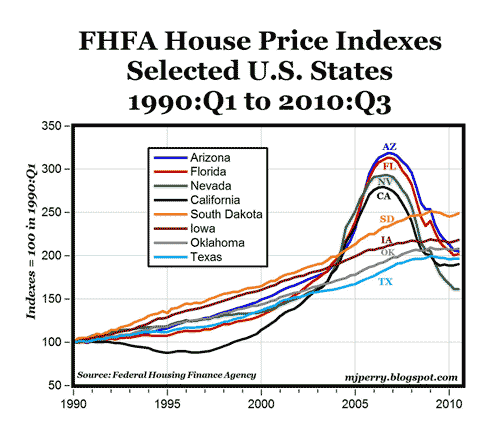
Cato’s Alan Reynolds writes in yesterday’s IBD:
“A front-page Wall Street Journal feature, titled “Housing Recovery Stalls,” worries that “a new bout of declining home prices is threatening to hamper the U.S. recovery.” A dip in the Case-Shiller moving average of home prices in 20 cities for August to October is said to be “troublesome headwind” for the economy in 2011, and “markets such as Sacramento, Las Vegas and parts of Arizona and Florida are at risk of more declines.”
Some of those cities may indeed account for a significant share of the Case-Shiller index, because that index covers only 20 cities (and Sacramento, the centerpiece of the story, is not one of them). However, a few troubled cities in a few states do not represent the entire nation.”
Alan concludes that “anxiety about falling home prices is based on a limited sample of 20 cities,” among several other factors.
Reynolds also refers to a WSJ editorial from yesterday, where Peter Schiff warns that “…third quarter 2010 declines in the Standard & Poor’s Case–Shiller home-price index—including very bad October numbers reported this week—have sparked concerns that a “double dip” in home prices is probable.”
MP: The chart above of FHFA house price indexes in eight states (data here) helps to support Alan Reynold’s position about falling home prices being heavily concentrated in large cities that are included in the Case-Shiller home price index. While states like Arizona, Florida, Nevada and California have experienced housing bubbles and huge price declines in recent years, many other states like South Dakota, Iowa, Oklahoma and Texas have seen fairly steady, but very mild increases in home prices, with no bubbles and no house price corrections. Especially in many states in the middle of the country stretching from Texas all the way up to the Dakotas, it will be hard to have a “double dip” in home prices because they haven’t yet had the “first dip.”



Under Alan Reynold’s presumption, the original bursting of the housing bubble shouldn’t have caused that much of an impact because only some states had a housing bubble in the first place. If the states included in the Case–Shiller home-price index do have significant further declines in home prices, there’s no reason to think the effects would be any less severe because it’s limited to the states that were hit hardest by the housing bubble the first time around.